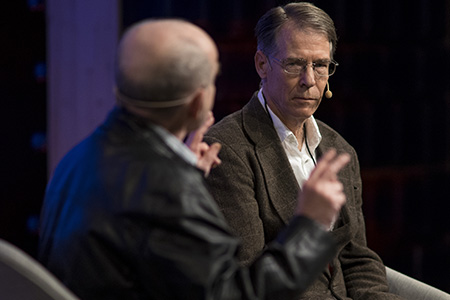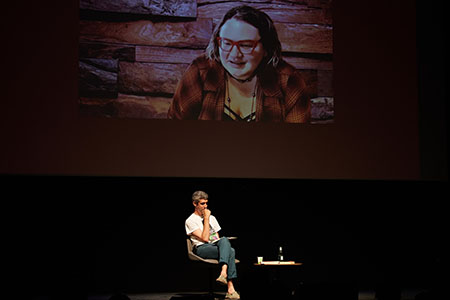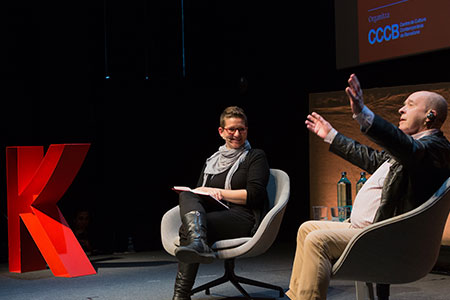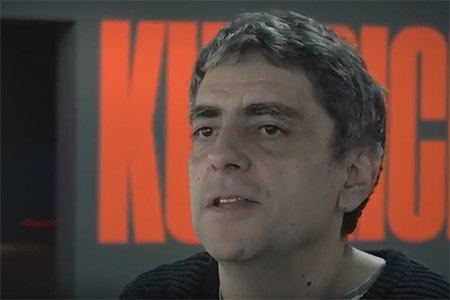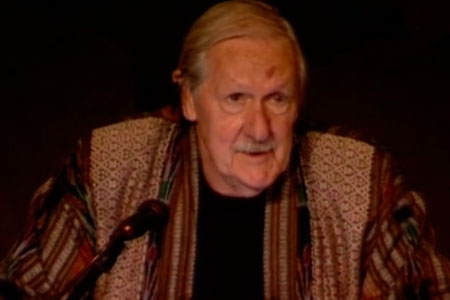Science Fiction and Fantasy
In one of his talks at the CCCB, the writer Kim Stanley Robinson defined science fiction not only as a metaphor for the present, but also as a genre that links us to the most urgent problems on the planet. We bring you Kim Stanley Robinson's testimony and that of other authors who have spoken to us about the value of telling extraordinary stories in series, books, films, comics and video games.
Kim Stanley Robinson and Ian Watson
The New Reality: Climate Fiction
‘Climate Fiction’, set in the near future, is the realistic fiction of our time, and Kim Stanley Robinson is its leading practitioner. Veteran SF author Ian Watson will discuss with Kim Stanley Robinson his career committed constructively to surveying how our human race may survive ...
Neil Gaiman
Neil Gaiman is a creator of science fiction and fantastic stories that become novels, comics, films, and plays. His world is inhabited by eternal and terrible creatures or by children who exchange their father for two coloured fish. We spend an evening with this author of exceptional imagination ...
Kameron Hurley and Víctor García Tur
Feminism in the Age of Geeks
The standpoint of gender has changed science fiction and Kameron Hurley is overturning paradigms and enriching the genre in many directions.She speaks with Víctor García Tur, winner of the Sant Jordi Prize with his L’aigua que vols (The Water You Want ...
Hervé Le Tellier and Pablo Martín Sánchez
Parallel Universes
Speculation is the departure point for many great stories. Ever since the Iliad, starting from a hypothetical “and if…” and exploring parallel universes, possible futures, and uchronian pasts, have allowed us to test the contradictions of our world. In today’s ...
Ian Watson and Laura Huerga
Worlds of Ursula K. Le Guin
The science-fiction writher Ian Watson and the publisher Laura Huerga talk about the film Worlds of Ursula K. Le Guin by Arwen Curry (EE.UU, 2018, 68'), a documentary which offers a journey through the worlds, both the real and the fictional, of Ursula K. Le Guin, best known for her ...
The Women Men Don’t See
Ricard Ruiz-Garzón
Among the authors who most helped to renew science fiction in the 20th century was James Tiptree Jr.: the pseudonym of a woman, like those who today are leading the revolution of the genre.
Mars, feminism and popular culture
Elisa McCausland
In this podcast, the critic and researcher Elisa McCausland conflates the relationship between Mars, feminism and pop culture from the 1950s to the present day.
Jordi Costa: “Kubrick knew that his art was going to live on”
Interview with the cinema critic and curator
Jordi Costa underlines characteristic elements in Kubrick’s body of cinematic work: humour, desire, violence and humanism. Costa also comments on the links between Kubrick’s cinema and literature and the eminent importance of a work like 2001: A Space Odyssey in the history ...
Brian W. Aldiss
I Kissed Kubrick's Daughter
The writer outlines the essential characteristics of the best science fiction, calling for special intelligence on the part of the reader, a necessary participant in a “fierce game” in which Aldiss tends to attack fundamental beliefs that other forms of popular literature only go to confirm.
Shall We Play a Game?
Inés Macpherson
We explore the relationships between science fiction and video games, two narrative forms with a great capacity for imagining new universes.
Kosmopolis Radio. Science Fiction: An Experimental Mythology
Novel of anticipation, novelised science, fantascience, speculative fiction… Many definitions have been given for science fiction, a form of literature that has given rise to an (experimental) mythology of our time. In this podcast we approach one of the richest and most complex ...
Jorge Carrión & Nacho Vigalondo
Science-fiction: Series or Films?
When it comes to science fiction in the 21st century, which is at the forefront – film or television? Which language is better, more daring, more suitable, more innovative? Have series overtaken film? Are Lost, Battlestar Galactica and Fringe more interesting than Matrix and Prometheus? The film director Nacho Vigalondo and the writer Jorge Carrión debated these questions during the literature festival Kosmopolis 2013.
Science Fiction Culture
Jose Valenzuela Ruiz
Science fiction allows us to lose ourselves in extraordinary stories and at the same time learn about science in an entertaining way. The fictional worlds of films like Blade Runner, Foundation, Interstellar, and Solaris have led ...
Elizabeth Hand, Cory Doctorow, Brian W. Aldiss, George R. R. Martin, John Clute and Kim Stanley Robinson
6 authors talk about science fiction
A special report for the Kosmopolis 2005 festival from the 63rd World Science Fiction Convention held in Glasgow from 4 to 8 of August 2005, with a series of exclusive interviews conducted by Marcial Souto with Elizabeth Hand, Cory Doctorow, Brian Aldiss, George R. R. Martin, John Clutte and ...
